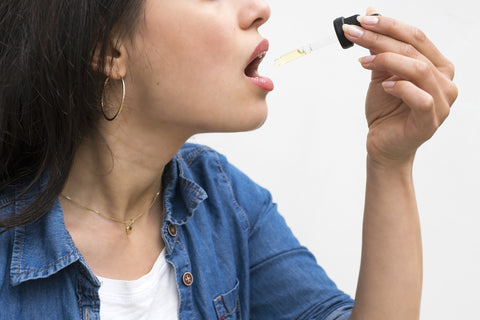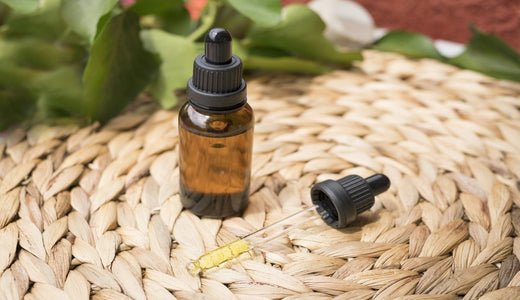Your Cart is Empty
FREE SHIPPING ON ALL ORDERS $75+
CBD oil products make up a large portion of the CBD industry, but there’s still some confusion about CBD in this oil form and how it differs from hemp oil and other types of CBD products.
“CBD oil” and “hemp oil” are often used interchangeably, but that’s actually very misleading.
If you plan to purchase CBD oil, understanding the difference is kind of a big deal, especially since some “hemp oil” products may not contain any CBD at all!
No worries! Here’s everything you need to know about CBD oil before you buy:
Table of Contents
What is CBD Oil?
CBD Oil vs Hemp Oil
Is CBD Oil Legal?
Potential Benefits of CBD Oil
How is CBD Oil Used?
How Much CBD Oil Should I Take?
Can I Take CBD With Other Medications?
Is CBD Oil Safe?
Key Takeaways
Resources

“CBD oil” actually refers to a broad selection of CBD products, but the most notable type of CBD oil product is an oral solution that generally consists of CBD and a carrier oil.
If you don't know already, CBD, or cannabidiol, is one of the most abundant non-psychoactive cannabinoids found in cannabis. CBD is popular because of its vast health potential, which you can read more about here.
These oral CBD oil products are frequently called “tinctures,” though many CBD brands use another description like “CBD oil drops.” That’s because the term “tincture” usually refers to an herbal solution that is extracted in alcohol, and the final “tincture” still contains some amount of alcohol.
Oral CBD oil products, whether the brand refers to them as “tinctures” or not, usually don’t have alcohol (but some of them might!).
These CBD oil products range in potency and style. In addition to CBD (which may show up on labels as “phytocannabinoid-rich hemp extract”) and a carrier oil (which can be a hemp-derived oil or other food safe, plant-based oil), oral CBD oil products may also contain additives like flavoring, herbs, or essential oils.
Sometimes, terpenes or other cannabinoids may be added to the formula to provide the potential benefits of the “entourage effect” (which you can read more about here).
“CBD oil” may also refer to an oil-form of CBD concentrate. This oil is also taken by mouth, but it is usually highly concentrated and very thick compared to CBD tinctures. That’s because CBD oil concentrate products don’t have an added carrier oil. They are often made from the “crude oil” hemp extract with very little extra processing.

Although CBD oil is frequently confused with hemp oil, the two are very different.
“Hemp oil” refers to the oil solution extracted from hemp plants. This oil may contain CBD, but the CBD content is generally not the focus when manufacturing hemp oil.
In fact, hemp oil is generally extracted from hemp seeds, which contain about 30-35% oil by weight but usually less than 1% CBD.
Hemp oil has multiple skincare applications that make it a popular additive in beauty products, but these aren’t the same as CBD skincare products because they usually don’t contain significant amounts of CBD.
Hemp oil can be used for cooking and in many different types of recipes, and it’s popular as a “health food” because it contains important essential fatty acids.
In short, the focus of “CBD oil” products is extracting hemp’s rich CBD content. Hemp oil, on the other hand, is made by extracting the natural fats found in hemp and it may not contain any CBD at all.
Because CBD oil is derived from cannabis (which is still illegal in many parts of the country), people often wonder about the legality of CBD oil.
It's complicated, but CBD oil can be made, sold, and bought legally in the United States according to the 2018 Farm Bill, which includes the Hemp Farming Act of 2018.
The only caveat is that CBD oil must be made from a type of cannabis plant classified as "industrial hemp."
Industrial hemp strains, by definition, contains less than 0.3% THC, the cannabinoid responsible for the psychoactive "high" associated with cannabis.
Legal CBD products will also contain a THC content under 0.3%.
It's also important to note that this legislation affects CBD legality on a national level, but local legislature may differ.
It's always a good idea to check your local laws regarding industrial hemp and cannabinoids to ensure that CBD is legal in your area.
CBD, the main component of CBD oil products, has been gaining a lot of traction in the health and wellness communities thanks to its interaction with the Endocannabinoid System.
The Endocannabinoid System spans throughout the body, and endocannabinoid receptors can be found in the brain, skin, and other major organs. This system has many functions and plays a hand in most regulatory processes, like regulating mood, body temperature, appetite, immune system responses, and more.
According to research, multiple chronic conditions may be linked to an endocannabinoid deficiency. CBD interacts in a way that is believed to help create balance within the Endocannabinoid System that may correct this deficiency, giving it a wide range of potential benefits.
Most evidence regarding CBD’s health benefits is preliminary, with the exception of CBD use for controlling seizures, which has been extensively studies. There is one pharmaceutical CBD oil medication designed to treat a rare form of epilepsy.
Preliminary research suggests that CBD may be beneficial for managing symptoms related to certain autoimmune diseases, various bowel diseases, diabetes, skin conditions, pain, anxiety, depression, PTSD, and more, but more research is needed before any of these health benefits can be confirmed.
Research regarding CBD’s interaction in the body dates back decades, but most significant medical advances have been delayed due to legal restrictions surrounding cannabis. With new hemp legislation in order, research regarding CBD’s benefits is expected to continue to expand.

CBD oil is an oral dosing product that's taken by mouth, but dosing methods vary slightly by product.
Most often, you'll see CBD tinctures or oral drops that instruct you to drop your CBD dose under your tongue. This is known as "sublingual dosing."
To date, there have been no studies aimed at identifying the specific difference between CBD dosing routes, but sublingual doses are generally thought to have a higher rate of absorption, referred to as "bioavailability."
When CBD oil is dropped under the tongue, the solution can be absorbed by mucous membranes in the soft tissue of the mouth. Here, CBD is thought to be absorbed directly into the bloodstream, consistent with the way that many sublingual medications work.
Sublingual dosing may help avoid first-pass digestion, a phenomenon where a substance is heavily filtered by the liver before it reaches the bloodstream.
First-pass digestion may result in much if the ingested CBD being degraded before the body can put it to use.
Generally, CBD oil products will call for a sublingual dose where you hold the oil under your tongue for a specified amount of time (usually around one minute) and then swallow it. CBD that is not absorbed in the mouth then needs to be processed by digestion.
Because of this "dual dosing" mechanism, there is some argument surrounding how long CBD tinctures take to kick in.
Many brands suggest that their CBD oil works quickly, in 15-30 minutes, because of its rapid absorption under the tongue. Others may say to wait an hour or longer for the "swallowed portion" of CBD to be metabolized.
In reality, the amount of time CBD oil takes to kick in will vary by formula, dosage, and person.
If you're new to CBD oil, dosage can seem confusing. You won't find any one-size-fits-all dosing charts because CBD products and individual dosage needs vary greatly.
Many people have success following the recommendation of the CBD brand they choose.
Of course, these recommendations also vary from brand to brand and are not tailored to meet individual needs.
Factors that may affect CBD dosage include health conditions, weight, age, diet, and other unique biological factors.
The best course of action may be to start with a small dose and increase slowly, monitoring your affects along the way.
Many CBD oil products make this easy because the dose can be precisely measured each time, unlike capsules or edibles that come in sore-measured doses.
CBD is most effective when taken regularly, so you may keep a steady dose for a few days before deciding to increase. Then, increase your dose slowly until the desired effects are reached.
Many people who already take prescription medications find interest in CBD but worry about the possibilities of drug interactions. There aren’t many studies that investigate CBD’s potential drug interactions, but we do know that it may interact with medications that come with a grapefruit warning.
If you haven’t heard of the “grapefruit warning,” it refers to a cautionary label on some medications that suggests avoiding grapefruit or grapefruit juice alongside the medication dose.
This is because grapefruit is metabolized by cytochrome P450 liver enzymes, which are the same ones needed to metabolize many medications. If both substances are taken at the same time, there may not be enough of these liver enzymes to go around, resulting in some of the substance passing through without being metabolized.
CBD also relies on these liver enzymes, so it may reduce the efficacy of some medications if taken at the same time. Of course, this is dose dependent, and many people find that they can avoid these interactions by taking the doses a few hours apart.
To avoid conflict, you should always consult a doctor before adding CBD to your wellness routine, especially if you take other medications.
Although evidence is limited, no severe reactions to CBD oil have been reported to date.
In fact, most research regarding CBD's safety profile is generally favorable of the cannabinoid.
One study regarding CBD side effects suggests that CBD is generally safe and that the most commonly experienced side effects were tiredness, diarrhea, and changes to appetite or weight.
The safety of CBD oil products may have more to do with the individual ingredients, such as carrier oils that are potential allergens.
Residual solvents leftover from the extraction process, contaminants like mold or microbials, and synthetic additives (especially synthetic cannabinoids) also pose a potential threat.
As a consumer, you can greatly reduce this risk by choosing high quality CBD oil made from industrial hemp and other natural, high-quality ingredients. Find a manufacturer that utilizes third-party batch testing to ensure the potency and purity of every product.
Research efforts regarding safety and potential side effects of CBD oil are expected to continue to increase.
“CBD oil” refers to a selection of CBD products sold in liquid form meant for oral dosing, not to be confused with “hemp oil”, which refers to the fats extracted from the hemp plant that are used for cooking and skincare products.
The main difference in CBD oil and hemp oil is that CBD oil has a potent CBD content, and hemp oil may contain no CBD oil at all.
Even though it is misleading, the two terms are often used interchangeably, so it is important to check the CBD content of products before you buy.
CBD oil products are taken by mouth, usually by dropping the solution under the tongue, which is called “sublingual dosing.”
Sublingual dosing allows CBD to be absorbed by mucous membranes in the mouth. This is why CBD oil is frequently regarded as one of the most direct dosing methods.
Generally speaking, CBD oil poses a good option for beginner CBD users because the dose can be precisely measured each time. There are no set rules for CBD dosing, so the ability to increase and decrease the CBD dose as needed is crucial for CBD users who are still working out their CBD routine.
Comments will be approved before showing up.



